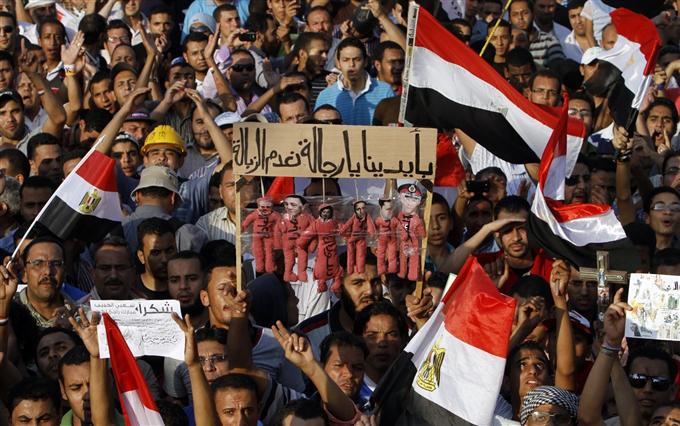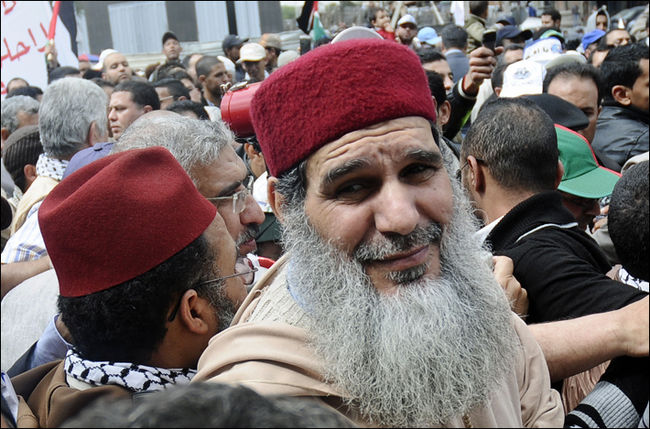Arab Spring means we’re not losing our religion at least. But at what cost? Martin Jay argues that political upheaval by citizens rather than institutions is paving the way for terrorist groups to take route across the Arab World.
There used to be an old Woody Allen gag which parodied two old women in a retirement home. One complained to her friend that the food in the home was poor. Her friend pondered on this before replying “yes, such small portions too!”.

Isn’t democratic reform in the Arab world much the same serving?
As each day passed in Lebanon, we hear rumors of increased numbers of young, fanatical Sunni men traveling to Tripoli to enroll as fighters with the ‘Free Syrian Army’ (FSA) in neighboring Syria where a war is ravaging largely between a self-imposed ‘royal family’ of Alawite elitists (and their loyal foot soldiers) and a Sunni underclass, made up of a patchwork of, amongst others, religious fanatics. But does this recent wave of supporters, or indeed, the widely covered news just last week of Russian VIPs being evacuated out of Syria (and the Russian PM quoted as saying he couldn’t see how Assad could stay on”) give us any hope of a positive outcome in Syria? Sadly not.
“While many western pundits, including myself, are ready to say that it is high time Assad steps down, it is reckless to counter that by saying that this mosaic of various Sunni factions – some extremist – which are doing most of the fighting today are the answer”
Let’s not forget that the war in Syria is only not a religious one by White House aides and experts from the foreign office in London. It would, after all, be very difficult to explain to the folks back home why British SAS elite soldiers are training young Syrian men how to handle weapons and explosives – not to mention the occasional British Pakistani ‘jihadist’ from south London who also turns up for the party on the Turkish border. And if you want another gag, consider the tales I hear from US diplomats who have been “assured” by the Syrian fighters that once they win control of Syria, they will take the weapons off the fanatics who helped them in the battle. I’m not making it up.
For those on the ground, goaded on by a handful of religious fanatics, the war is certainly a holy one as few Gulf States in the region consider the Alawite authoritarian rule in Syria to even be Muslims. It’s all about religion. And beyond Syria, we can see similar themes emerge in Egypt, Tunisia and to some extent in Morocco. Arabs are having a fling with extremist strands of Islam. They’re risking it all for a quick fix to decades of corruption and looting of their own countries.
But here’s where it gets awkward. As even in America, where we saw the emergence of religious fanatics of the 80s fight their own jihadistic battle with the Russians in Afghanistan, those same neo-conservatives proved that religion is a poor substitute for governance. The neo cons’ obsession with Afghanistan did certainly help win the war there and remove the Russians. But it did not accelerate the collapse of the USSR. Interestingly, those same neo cons were wheeled out of the retirement homes and ferried to the White House days after 9/11 and, spectacularly concluded almost immediately that they had discovered an international network of terror cells run by a chap called Bin Laden. They got it wrong, and actually created the myth of Al Qaida and its rather socially dysfunctional leader. Perhaps more importantly, bringing in the religious fanatics to extrapolate some moral residue from the gruesome remains of political experiments can be a very tenuous and once-lived reaction from western leaders in office. A sort of vaccine. Very quick, painful but worth it in the long run to rid your body of a nasty virus.
But many would argue that in the Arab World, the virus is religious fanaticism itself when it is fused with politics. Unlike the west which has evolved with democratic machinery that allows its electorate to make choices about specific political ideologies – ostensibly on how to spend taxpayers’ money on public services, health, education and defense – Arabs have not come very far since they broke away from their Turkish masters in 1918 (with the exception of Morocco of course). The Arab Spring actually means many things to many people. Or, if you like, to western journalists, it often means nothing at all. In Morocco it meant equality when dishing out jobs and hammering corruption although many of those who shouted so passionately in the Fevrier 20 demonstrations I witnessed and covered as a journalist were actually crying for a sort of European-like socialist governance, based, comically, on a French model of free healthcare and controlled fuel prices etc. Many were ignorant of how the developed world works and how well off Moroccans are, compared to other Arab countries. They demanded civil servant jobs’ handed to them, once they left university, for heaven’s sake!
“Moroccans are special in that when they complain about how bad off they think they are, they face Europe and crave what the French or Belgians have; most Arabs look at their Arab neighbors”
But whichever direction you face, some themes have emerged. Countries which have kingdoms – Morocco, Jordan, KSA, – have curtailed their civil unrest, for now. I once referred to Morocco’s demonstrations as a “Sauce béarnaise revolution” and was scolded for this from my Moroccan friends. Whereas Moroccans wanted democratic reform in the form of better rights, most Arabs in other countries were begging for any rights on offer. In countries which had diverse ethnic groups, only the fiercest and most brutal rein seemed to be the only option – Syria and Libya for example – as even having the nerve under these regimes to even think beyond what the state media told you was fact, was usually a crime. When I was in Syria in 2007 covering Assad’s haggling over the fine print of an EU trade deal, his own henchmen were arresting poets.
Religion appears to be the only winner of the Arab Spring as Arab countries have simply not spurned new political parties which are mature enough and have the credibility to offer a third way

But all Arabs now are doing a lot of thinking. And while some are turning to religious groups for solace and some sort of band-aid governance, others have already ticked that box and have already realized that they have jumped out of the pan and into the fire – certainly in the case of Egypt whose religious leaders are battling just this week with the state’s judiciary who don’t like the writing on the wall from the Muslim Brotherhood: ‘We’re taking over now, time for you to retire.’ And even in Morocco, the honeymoon is over for Benkirane and his buddies who, if they haven’t realized that they can’t spend their way out of a political demise, then certainly the mainstream parties have and are already preparing for the PJD to complete their one term and let the real politicians come back in and run the economy.
Yet what brought about their sensational take-over in the first place? I would suggest a fatigue which has affected Egypt and more so Syria whereby citizens woke up to two realities: firstly, they want change. And secondly, they don’t know what that change should be, hence, bypassing the ‘establishment’ of mainstream politicians and pressing the ‘reboot’ button: religion. And so religion as a vote is a message: ‘We still don’t know’.
Religion appears to be the only winner of the Arab Spring as to date Arab countries have simply not spurned new political parties which are mature enough and have the credibility to offer a third way. Given the choice of the old guard – which ensures that its own people take all the key jobs in government and whose godfathers in industry get all the cards dealt in their favor in industry – and the chance to take part in some kind of dialogue which might be a catalyst to the creation of a new political revolution in the Arab world, and most people don’t miss a heart beat in choosing the third option, religion. You could argue there is not much choice but the Arab world has failed its people by not acting sooner to allow a genuine political spectrum to emerge. Many Arab leaders argue that a European-style democracy would only not adapt itself well, but also be a disaster in societies which simply wouldn’t react well to ‘liberty’. And there is much to be said for this argument. In the meantime, most leaders in republics have concentrated only on building their own image up as pseudo royal families and inventing their legacies, rather than building institutions and developing the economy. Khadafi, Mubarak, Ben Ali and certainly Assad all saw the reverence that Arab monarchs had and emulated them by reinventing themselves.
But the political vacuum of what was left in many of these countries in the Arab world is now being filled by religious leaders, many intent on creating mayhem and murder, if their objections are not met. The Arab Spring has resulted in people concluding that there are no viable political figures who can enable change. Thus, change will have to be brought about by its peoples and their social networking tools. But what has it taught them all? Actually they don’t really want change. They just want the old, corrupt elite out and a new moral order in. Unfortunately, hardcore religious groups, like the Salafists have taken the political ground and can be seen quite openly in Egypt and Syria. Few deny the Salafist influence from Saudi Arabia is driving the rebels in Syria to fight. And even fewer can deny the Muslim Brotherhood’s inspiration in Eqypt where it is struggling to present its policies to people who trust its virtue. But even recently in Mali, on the periphery of the Maghreb world, we also see them emerge as they no longer need the Sahara to provide their henchmen – many desert bandits who were smugglers for decades – with bounty, but groups based in Saudi Arabia to fund them.
“Why is it though that London and Washington refuse to acknowledge that the Arab Spring has created a vacuum – one of which is being filled by Saudi-based religious groups?”
Why are the Salafists still under the radar when their influence and money is now right in front of our eyes each day on cable network news? The answer has always typically been that we don’t upset the Saudis as they are the real shakers in the region – or they provide us with cheap oil and buy our weapons.
Yet all that is changing fast. In the next 2-3 years America will be almost entirely dependent on its own energy as Shale gas will drive all its electricity turbines and give its industry the very thing it badly needs to leverage China: dirt cheap fuel. And with Obama already pulling out of the Middle East and concentrating on the pacific, it leaves many observers in the region wondering whether the Saudis will stretch their wings even further when left to their own devices.
Some might argue that they are already doing that. The Saudi Salafists have scored an unparalleled victory already in Syria. What is happening today there is that the vast majority of Sunnis have decided that religion now is the only avenue open to them as a moral entity to replace politics, which Assad’s brutal rule assured would have no legitimacy, even as an idea. The Salafists have already won the war in Syria, in fact, as they have reduced it to a religious battle, when it should have been an off-the-shelf straight forward overthrow of an outdated dictatorship. The Russian PM just recently commented that he thought Assad had made a mistake to not open dialogue with the Sunni community much earlier on. But he somehow missed the point, revealing perhaps a tranche of shocking ignorance of what was happening on the ground in Syria. Assad made no mistake. He knew they didn’t want to sit down with tea and sweet Middle Eastern biscuits when their children had just been kidnapped by uniformed thugs and taken to Damascus – for writing anti government graffiti on a school wall.
As I write this, a car bomb has just exploded in a Shia area of Beirut reminding me that even in Lebanon, the Salafists are hard at work. But then they cannot be singled out for acts of terrorism here as all political parties resort to it and it only serves to remind us that we are heading towards elections in just a few months.
 But all Arabs now are doing a lot of thinking. And while some are turning to religious groups for solace and some sort of band-aid governance, others have already ticked that box and have already realized that they have jumped out of the pan and into the fire – certainly in the case of Egypt whose religious leaders are battling just this week with the state’s judiciary who don’t like the writing on the wall from the Muslim Brotherhood: ‘We’re taking over now, time for you to retire.’ And even in Morocco, the honeymoon is over for Benkirane and his buddies who, if they haven’t realized that they can’t spend their way out of a political demise, then certainly the mainstream parties have and are already preparing for the PJD to complete their one term and let the real politicians come back in and run the economy.
But all Arabs now are doing a lot of thinking. And while some are turning to religious groups for solace and some sort of band-aid governance, others have already ticked that box and have already realized that they have jumped out of the pan and into the fire – certainly in the case of Egypt whose religious leaders are battling just this week with the state’s judiciary who don’t like the writing on the wall from the Muslim Brotherhood: ‘We’re taking over now, time for you to retire.’ And even in Morocco, the honeymoon is over for Benkirane and his buddies who, if they haven’t realized that they can’t spend their way out of a political demise, then certainly the mainstream parties have and are already preparing for the PJD to complete their one term and let the real politicians come back in and run the economy.

